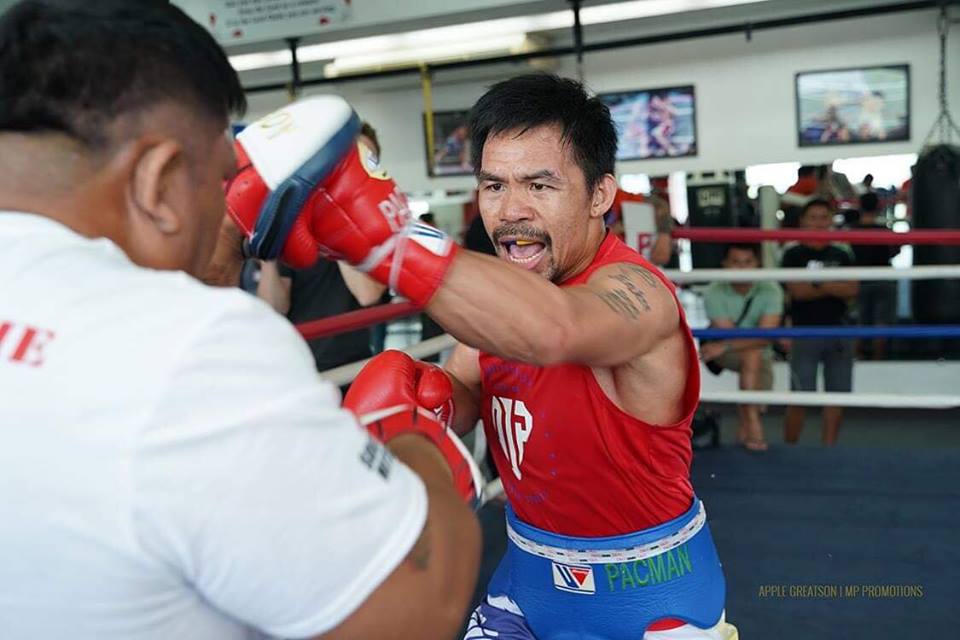
LOS ANGELES — Breakfast at Manny Pacquiao’s house began with a silent prayer, followed by more silence around the big dining room table as his massive entourage waited for the fighter to take the first bite.
On the morning menu in the Hancock Park house were steaming plates of rice, topped with slices of beef. A helper set a few pieces of chicken in front of Pacquiao and a small plate of dried fish to go with the rice and beef he had already half finished.
No need to watch his food intake in this training camp. Five days before his crossroads fight with Adrien Broner, Pacquaio was on his normal routine of five meals a day totalling 7-8,000 calories, almost all of which he’ll burn off in the day’s workouts.
The Filipino senator, philanthropist and boxer is in the winter of his athletic career, gearing up for what could be one big last fight. Saturday’s bout with Broner isn’t it — even with a pay-per-view price tag of $74.95. Pacquiao trains with the knowledge that a rematch with Floyd Mayweather could possibly be just months away if all goes well.
It’s why he began the day with a five-mile run in the rain through Griffith Park. It’s why he was at the Wild Card Gym in Hollywood a few hours later, pounding the mitts of trainer Freddie Roach before piling in a caravan of vehicles to head down the interstate to Las Vegas and what he hopes will be a spectacular night in the familiar MGM Grand arena ring.
“Not all boxers who reach the age of 40 can be like me,” Pacquiao said, pausing to turn some Sinatra on his phone to accompany his breakfast. “The discipline is still there, the hungriness to work hard and focus on the fight is still there. More importantly the fire is still there and so is the speed.”
Pacquiao used that speed to build a reputation and then a career that, even in the hard-scrabble sport of boxing, is remarkable. He began boxing to earn a $2 prize to help his mother feed the family. He made several hundred million dollars fighting, much of which he’s given away to others in the Philippines.
He’s back with Roach and on his way to his first fight in Las Vegas in more than three years. Everything seems familiar once again, a throwback to the days when he routinely fought for $10 million or more — and in the case of his 2015 bout with Mayweather, much more.
The Los Angeles house is a gathering place for Pacquiao, his family, and the ever-changing entourage that follows him at every step.
It’s also a shrine of sorts, with pictures of Pacquiao lining the hall and one of him standing over a prone Ricky Hatton upstairs. There’s a 2009 trophy for fighter of the year from the Boxing Writers of America and an ESPY from the same year, a reminder that it’s been a decade since some of the glory of his past.
And just behind Pacquiao’s spot at the head of the dining table is a painting of the Last Supper, a reminder of his devotion to religion that starts with a morning prayer and ends with Pacquiao on his knees at night with a final prayer before bed.
“When I punch I’m not relying just on my own strength,” Pacquiao says. “In my hands is the power from God.”
The talk is confident, though nothing more than what any fighter needs to believe before getting in the ring. Pacquiao has relied on his natural speed and power for a remarkable 24 years in a pro career that began at 16.
He’s an icon in his country, a senator whose 40th birthday party had a special guest in President Rodrigo Duterte. There’s speculation Pacquiao might one day hold that office, and he says he’s devoted to his work in politics and his work in fighting poverty in the Philippines.
But he’s also at an age where most fighters have long since retired. Boxing is a brutal sport, and long-term exposure usually isn’t good for your health.
But the sound of gloves hitting the mitts held by Roach at the Wild Card is unmistakable, a rat-a-tat-tat that is testimony to Pacquiao’s claim that his speed and power remain intact. He wants to knock Broner out not only to set up a possible rematch with Pacquiao but to show he’s still got fight in him.
“His work ethic is great, his footwork brilliant,” Roach said. “This morning I got four calls from people telling me Manny was out running in the rain when he should have stayed inside. I said bring him an umbrella.”
Pacquiao didn’t get the umbrella. He was soaking wet as he came in the front door of his home to meet, back from his run with a white towel wrapped around his neck.
This was moving day, when the entourage would pack up in vans and head down Interstate 15 to Las Vegas. Many would make the trip with Manny, others would come to Las Vegas later, hoping to get one of the 1,000 or so tickets that Pacquiao bought for his followers for the fight.
Pacquiao headed up the stairs to the shower, past a wall of photos of him in his biggest fights. For now, at least, time is frozen as he tries to will himself into the fighter he was a decade ago.
Downstairs, helpers started cleaning empty plates from the table. It was time to break camp, time to settle into the routine of fight week.
And, soon, time to find out just what Manny Pacquiao has left.